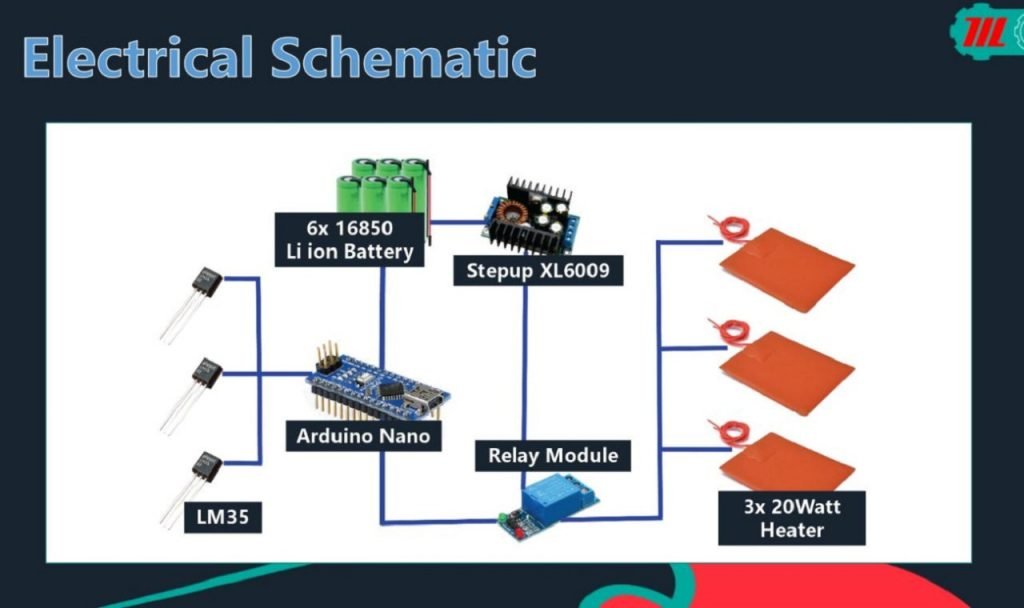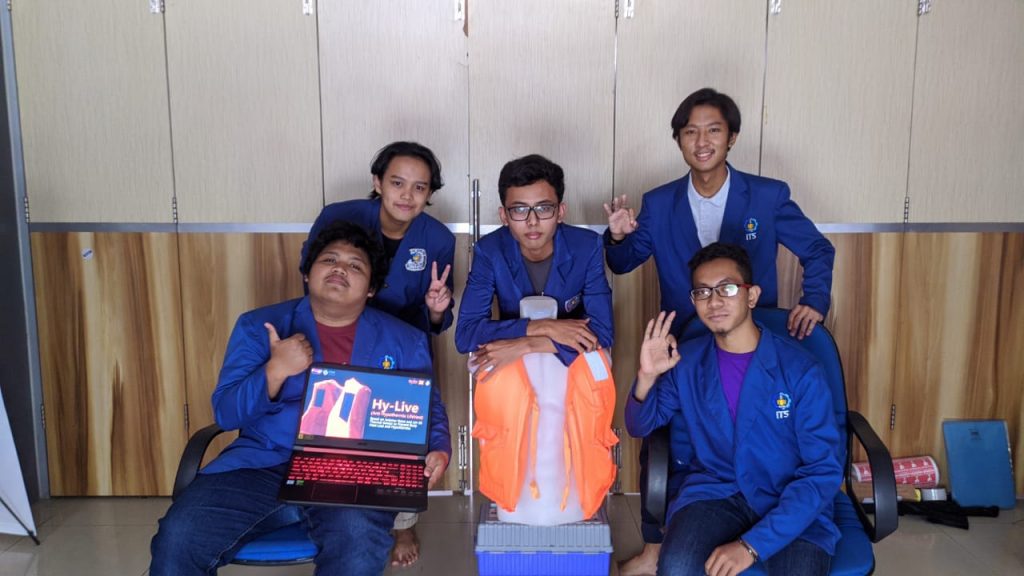ITS Students Create Live Vest to Prevent Hypothermia

Demits Evo 1 Team of ITS presents their innovation at I2ASPO 2020 event
ITS Campus, ITS News – When ship or water transport accident occurs, the biggest threat that causes a person’s death is a hypothermia attack that lowers body temperature. So far, there is no help on the problem because personal flotation devices or life vests on the market generally do not have a safety system to maintain body temperature. Concerned of that problem, the student team from Institute Teknologi Sepuluh Nopember (ITS), who formed the Demits Evo 1 Team created Anti Hypothermia Life vest or Hy-Live.
An innovative life vest equipped with a heater, that is used to prevent hypothermia in water transport accidents’ victims at sea. According to Ferdinan Ramadhansyah, Team Leader Demits Evo 1, Hy-Live can be an innovation for the safety field that can reduce the death rate due to ship accidents.
Ferdi, a student of the Department of Industrial Mechanical Engineering, explained that the Hy-Live life vest works using three LM35 sensors that have been placed at a certain point. The sensor will detect the victim’s body temperature and the environment. “Temperature readings are obtained from the area around the heater close to the skin of the body, where the heater is placed on the chest and back of the life vest,” he said.
Ferdi continued, the results of temperature read by the sensor were passed on to microcontrollers of Arduino nano type. Then, microcontrollers process data from all three sensors until reference temperatures are obtained as a reference for heater flame and die limits. “When the reference temperature is below normal body temperature (36 degrees Celsius, red), then the heater will light up and make the temperature around the heater warm,” he said.
According to Ferdi, when the life vest sinks, the heater will be dipped in water. Then, if the condition of seawater and the body, for example, is detected around 32 degrees Celsius, the heater will turn on. While warming the body, the sensor continues to read the temperature until the heater has made the ambient temperature reaches 55 degrees Celsius, the heater will turn off by itself.

Illustration of the electrical scheme in Hy-Live life vest components, designed by the Demits Evo 1 Team of ITS
The team under the supervision of Anastyar Tinatullah and the guidance of Madhuri SSi MT used aluminum as a component of the heater. As explained by Ferdi, they have used aluminum because it can distribute heat. “However, the use of aluminum because the life vest is still in the form of a prototype, so in the future, it has expected to use silicon heating pads or other devices that are more advanced,” said the student from Jogjakarta.
For this Hy-Live life vest, the team chose to use lithium-ion batteries. In this case, Ferdi and the team wanted to make improvements if this life vest got a chance to be mass-produced. “It is necessary to use a capable device so that the battery is protected from water, and we want to add indicators as a marker of battery power capacity,” said the student of the 2019 class.
From their creativity, Ferdi with four other colleague friends, namely Galih Sukma Adjie, Dyon Athallah Ramadhan, Athallah Ramadhan, and Saktiawan Okto Bertha Agustien. They were able to deliver this Hy-Live life vest to win a gold medal at the Indonesia International Applied Science Olympiad (I2ASPO) in the Applied Physics and Engineering category, recently.
Being awarded at the world-class competition made the Demits Evo 1 team feel very surprised and happy because they did not expect to get a gold medal. Even so, this makes them more motivated to participate in the next innovation competition. “For ITS students, do not be afraid to participate in various competitions. losing or winning is the last thing to worry about, most importantly we have to try with maximum effort,” Ferdi concluded. (tri/pan/HUMAS ITS)

Members of the Tim Demits Evo 1 ITS composed of (from upper left) Athallah Ramadhan, Ferdina Ramadansyah, Dyon Athallah Ramadhan, also (from lower left) Saktiawan Okto Bertha Agustien and Galih Sukma Adjie show the Hy-Live life vest prototype
Related News
-
ITS Collaboration with BPBD East Java, Launching VR Disaster Simulation
ITS Campus, ITS News — Supporting anticipation of disasters and continuing to educate the public, Institut Teknologi Sepuluh Nopember
January 21, 2021 16:01 -
Supporting the Implementation of Innovative Ideas, ITS and IYSA Hold International Competition
ITS Campus, ITS News — Institut Teknologi Sepuluh Nopember (ITS) has once again proven its commitment to supporting the
January 21, 2021 16:01 -
ITS Maintains Informative Qualification for Five Consecutive Years at KIP Awards
ITS Campus, ITS News — Institut Teknologi Sepuluh Nopember (ITS) has once again successfully maintained its Informative Qualification predicate
January 21, 2021 16:01 -
ITS Strengthens Smart Eco-Campus through UI GreenMetric 2024
ITS Campus, ITS News — Institut Teknologi Sepuluh Nopember (ITS) has once again demonstrated its commitment to environmental concern
January 21, 2021 16:01
